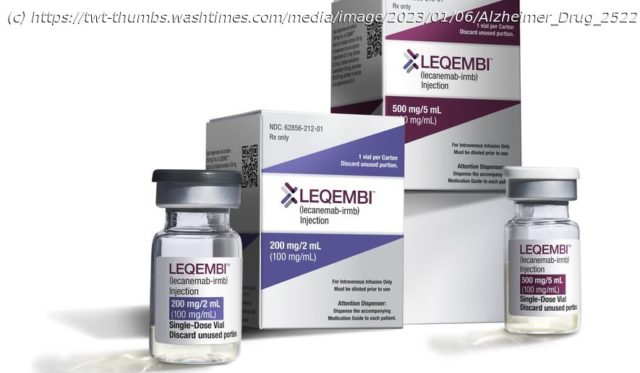Array
U.S. health officials on Friday approved a closely watched Alzheimer’s drug that modestly slows the brain-robbing disease, albeit with potential safety risks that patients and their doctors will have to carefully weigh.
The drug, Leqembi, is the first that’s been convincingly shown to slow the decline in memory and thinking that defines Alzheimer’s by targeting the disease’s underlying biology. The Food and Drug Administration approved it for patients with Alzheimer’s, specifically those with mild or early-stage disease.
Leqembi, from Japan’s Eisai and its U.S. partner Biogen, is a rare success in a field accustomed to failed experimental treatments for the incurable condition. The delay in cognitive decline brought about by the drug likely amounts to just several months, but some experts say it could still meaningfully improve people’s lives.
“This drug is not a cure. It doesn’t stop people from getting worse, but it does measurably slow the progression of the disease,” said Dr. Joy Snider, a neurologist at Washington University in St. Louis. “That might mean someone could have an extra six months to a year of being able to drive.”
Snider stressed that the medicine, pronounced “leh-KEM-bee,” comes with downsides, including the need for twice-a-month infusions and possible side effects like brain swelling.
The FDA approval came via its accelerated pathway, which allows drugs to launch based on early results, before they’re confirmed to benefit patients. The agency’s use of that shortcut approach has come under increasing scrutiny from government watchdogs and congressional investigators.
Last week, a congressional report found that FDA’s approval of a similar Alzheimer’s drug called Aduhelm — also from Biogen and Eisai — was “rife with irregularities,” including a number of meetings with drug company staffers that went undocumented.
Scrutiny of the new drug, known chemically as lecanemab, will likely mean most patients won’t start receiving it for months, as insurers decide whether and how to cover it.
The drug will cost about $26,500 for a typical year’s worth of treatment. Eisai said the price reflects the drug’s benefit in terms of improved quality of life, reduced burdens for caregivers and other factors. The company pegged its value at over $37,000 per year, but said it priced it lower to reduce costs for patients and insurers.






